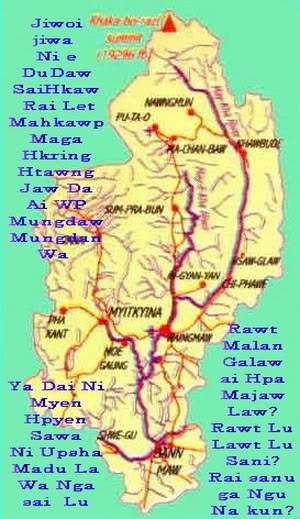By JOSEPH ALLCHIN
Shortly after China’s premier Wen Jiabao left Burma yesterday evening having signed a raft of agreements, work officially began on the 800-kilometer dual pipeline that will run from Burma’s west coast to Kunming, the capital of China’s southwestern Yunnan province.
The head of the China National Petroleum Corporation (CNPC), Jang Jiemen, and the head of the Myanmar Oil and Gas Enterprise (MOGE), signed several agreements confirming the CNPC as the controlling shareholder and leader in design.
China started building a crude oil port on Maday Island off the western coast of Burma last November to enable the transportation of crude oil, offloaded from the Middle East and Africa, through one of the pipelines. It has an estimated capacity of 240,000 barrels per day, and avoids the congested Malacca Straits south of Singapore to energise China’s less developed western regions. The gas pipeline meanwhile is expected to have a capacity of 12 billion cubic metres per year.
China has been deeply involved in the extractive industries in Burma, also signing a another hydropower deal this week. Exploration in the Bay of Bengal came under further scrutiny this week however after it was revealed by the Delhi-based Mizzima news agency that embattled US company, Transocean Inc. – responsible for the Gulf of Mexico drilling for BP, the sight of the US’s worst natural environmental disaster – had been engaged by a sanctions-listed company and individuals to work alongside the Chinese.
The individuals in question are Steven Law and his Singaporean wife, Cecila Ng. Law runs the Burmese conglomerate Asia World Company, which was set up by his father Lo Hsing Han on the back of vast profits made in the heroin industry, and was loosely supported by the CIA.
As well as Asia World being a designated contractor for construction of terminals in the pipeline project, Law and his wife are also the sole shareholders in the China Focus Development company, which owns three onshore and three offshore blocks, operated by the China National Overseas Oil Corporation (CNOOC).
The two companies hired Transocean to use a Panamanian-registered semi-submersible Actinia rig, despite the fact that the US Treasury in its sanctions guidelines clearly states that “all financial and commercial transactions by any US person with the designated companies and individuals are prohibited”.
Adding to this, the information regarding the transaction was submitted to the US market regulator prior to its $US206,000-a-day hiring back in October last year.
Chinese commentators, such as Song Qingrun in the Chinese state-mouthpiece People’s Daily newspaper, have said the increased bilateral ties will provide jobs and energy for Burma. But despite its mineral wealth, Burma continues to suffer severe electricity shortages at a time when bilateral trade with its northern neighbour reached $US2.09 billion in 2009.
What’s more, the pipeline has come under severe criticism from NGOs and rights groups who claim that lack of accountability, environmental degradation and wanton human rights abuses, including forced labour, plague the project.
Jun 5, 2010
Subscribe to:
Post Comments (Atom)
WUNPAWNG MUNGDAN SHANGLAWT HPUNG A NINGGAWN MUNGMASA
WUNPAWNG MUNGDAN SHANGLAWT HPUNG A NINGGAWN MUNGMASA
CHYE JU KABA SAI
Sa Du N'Gun Jaw La ai Majaw N'chying wa Chyeju Dum Ga ai,Yawng a Ntsa Wa Karai Kasang Kaw na N'Htum N'Wai ai Shaman Chye ju Tut e Hkam La Lu Nga mu Ga law




No comments:
Post a Comment